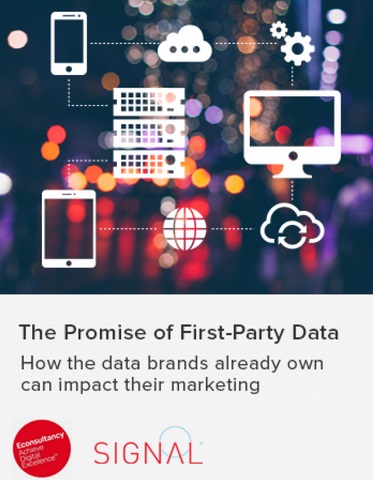There has been a massive increase in marketers’ use of first party data, with the use of third party data in decline, according to new research.
The study, from from Econsultancy and Signal show that top brands have adapted to the explosion of new devices and channels by collecting data from beyond the web: 60% collect data from mobile applications, versus 41% of their peers; 61% collect data from email/SMS, versus 47%; and 23% collect data from beacons, versus 8%.
First vs third party
Marketers have long relied on third-party data for their data-driven marketing efforts. But the most successful data-driven marketers are using first-party data at a significantly higher rate than other marketers, according to a new report from Econsultancy and Signal, the global leader in real-time, cross-channel marketing technology.
“Marketers are under pressure to provide more relevant customer experiences powered by insights from their users,” said Mike Sands, CEO, Signal. “This report highlights a sea change in the industry’s data landscape, as marketers increasingly turn to first-party data – data derived from their own customers – to fuel better personalization, more precise targeting and improved marketing ROI.”
The survey of North American marketers found that among those who report the strongest ROI from their data-related investments, 81% regularly use first-party data, compared to 71% of their peers.
First-party data provides the richest, highest quality insights into consumer behavior. Marketers across the board are becoming more reliant on this valuable data source, with 82% saying that they plan to use more first-party data in their campaigns, and none reporting that they will decrease their use of first-party data. In contrast, 1 in 4 marketers say they plan to decrease their use of third-party data.
The study also sheds light on second-party data, e.g. data shared among trusted partners, as an effective but underutilized data source. 77% of the highest-performing marketers regularly use second-party data, versus only 48% of their counterparts. And 60% of marketers plan to increase their use of second-party data, suggesting marketers are becoming more aware of the value in sharing their engagement data.
First-party data is marketers’ top choice for success across key metrics: 74% said it gives the greatest insight into customers, 64% said it offers the highest increase to customer lifetime value, and 62% said it provides the highest lift among data sources. Less than 10% of marketers surveyed reported the same benefits from third-party data.
Not only do companies with the most profitable data-driven initiatives prefer first-party data, they also report stronger capabilities in important data-related practices. For example, 66% excel at campaign targeting and analysis, 60% have strong personalization capabilities, and 59% are more successful at attribution and audience segmentation.
The report found striking differences in how high-performing marketers manage their data-driven efforts versus their peers. They have adapted to the explosion of new devices and channels by collecting data from beyond the web: 60% collect data from mobile applications, versus 41% of their peers; 61% collect data from email/SMS, versus 47%; and 23% collect data from beacons, versus 8%.
“Stitching together first-party data across devices and channels is the key to building insightful customer identities and supercharging marketing programs,” Sands said. “Signal’s Fuse platform helps make this a reality by powering a single view of the customer across online and offline channels that brands can use for smarter marketing.”
The survey of 302 marketers was conducted in May 2015. Respondents were from a variety of industries including retail, media, telecom, consumer packaged goods (CPG), automotive, and travel/hospitality. To download the report, entitled “The Promise of First-Party Data,” visit here.

